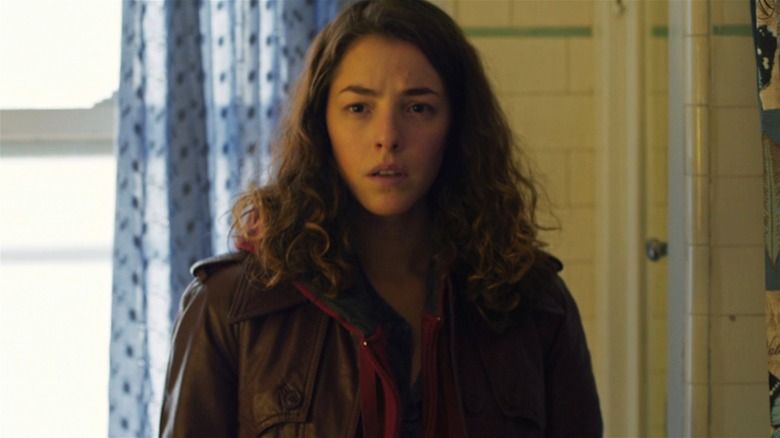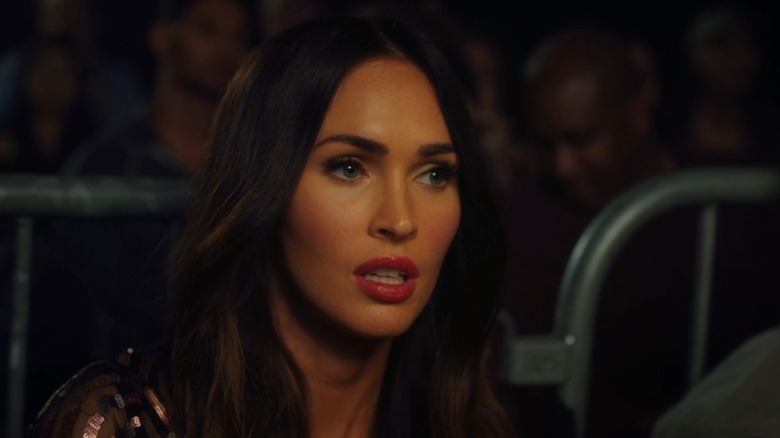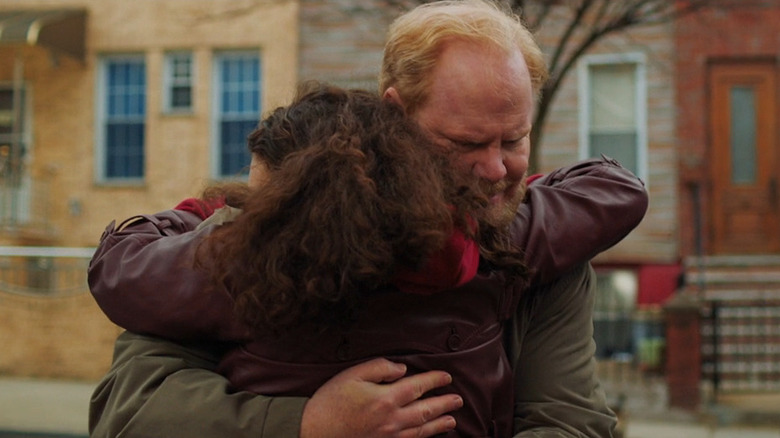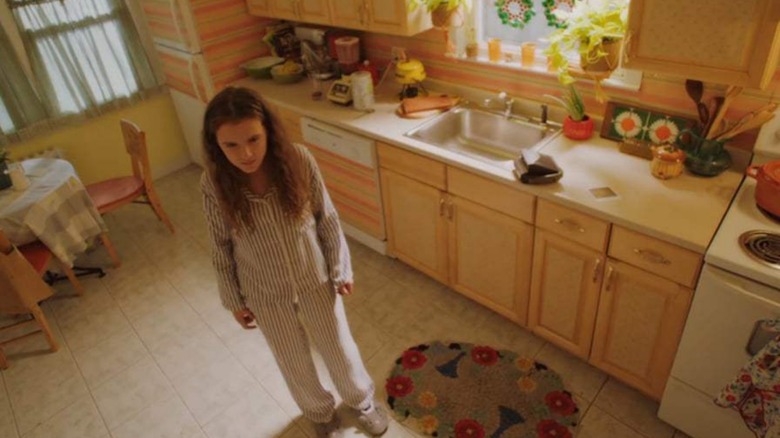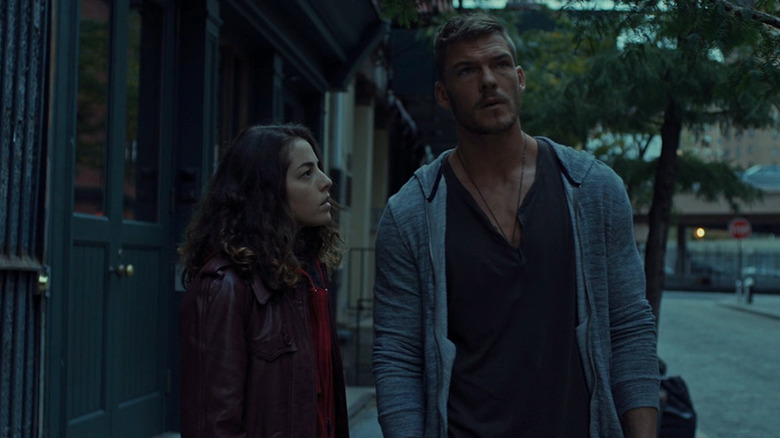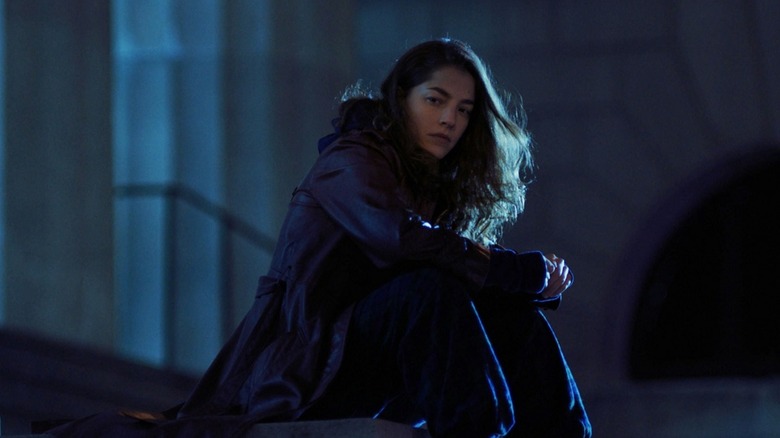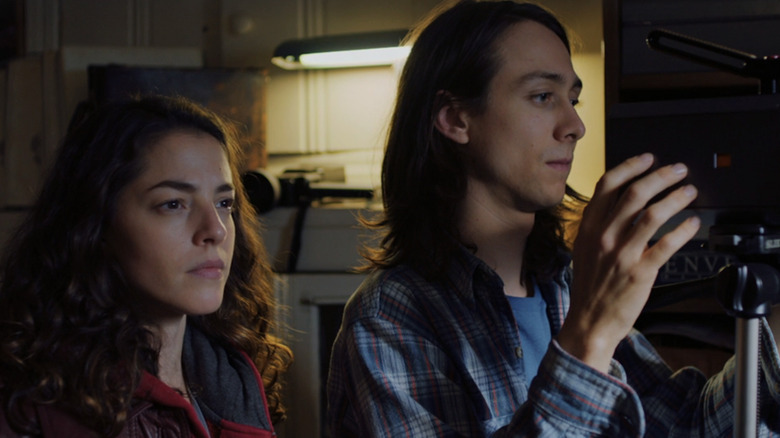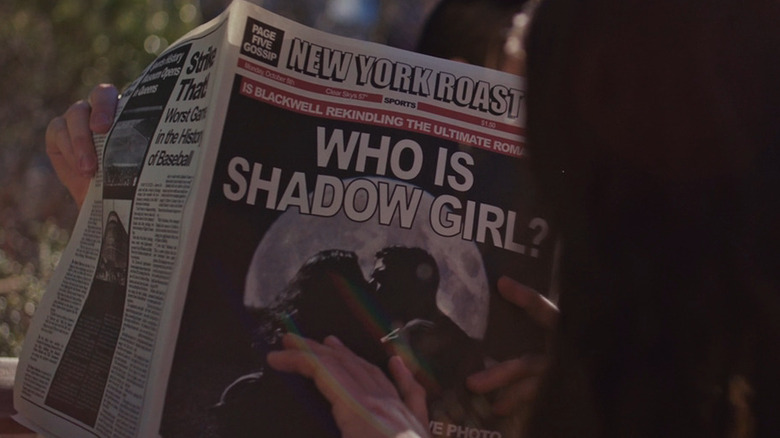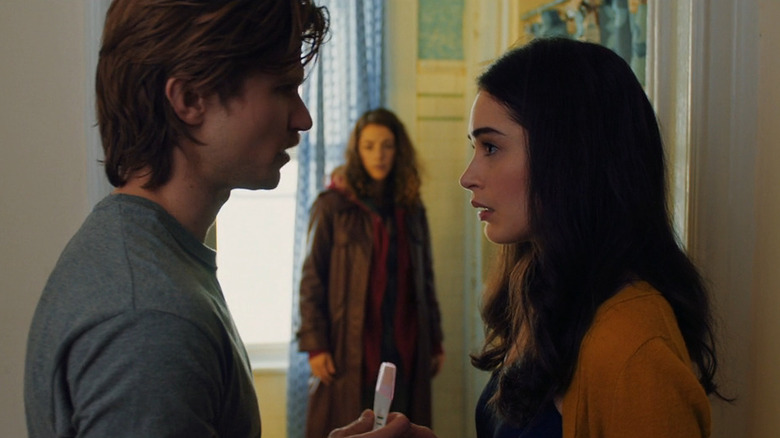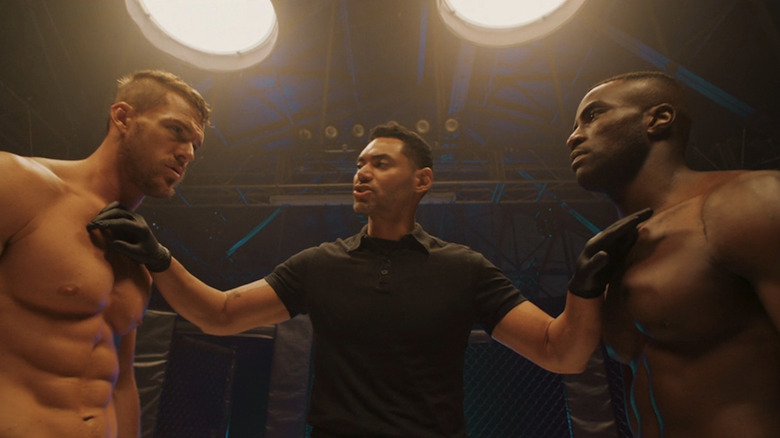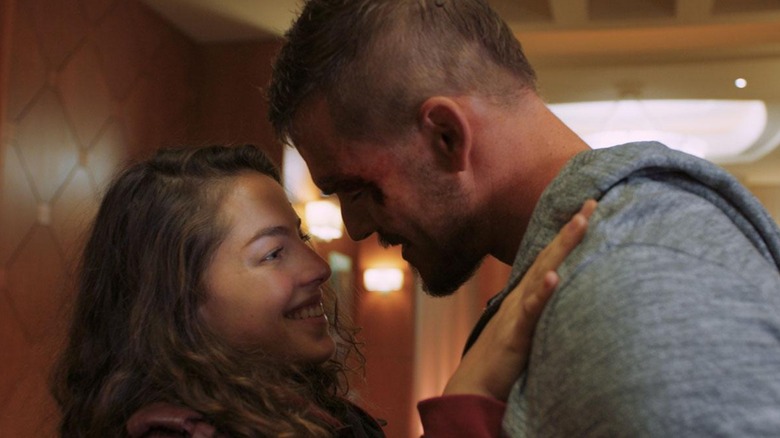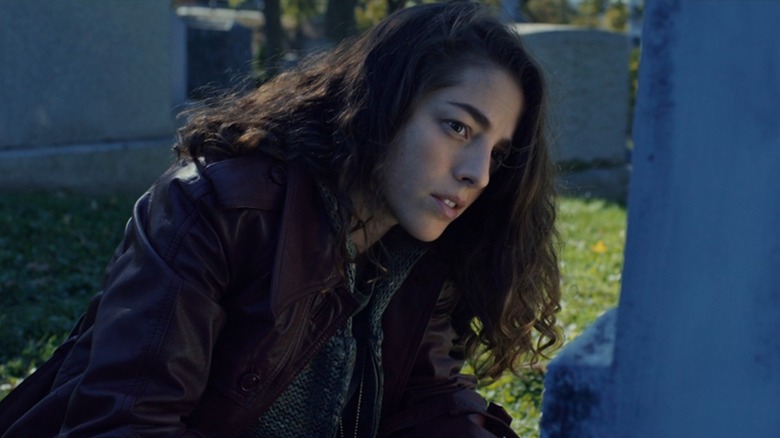The Ending Of Above The Shadows Explained
"Above the Shadows" is a supernatural romance about an invisible paparazzi who coaches a washed-up MMA fighter into a champion. (Don't worry, we promise it's not as ridiculous as it sounds.) The film is actually shot quite beautifully, and it explores the premise in a low-key and mostly realistic way. The filmmakers put a lot of thought into imagining the lifestyle of somebody who is functionally invisible. For instance, the film's heroine can't drive a car or hail a taxi, so she takes the bus by sneaking aboard behind other passengers. After all, she's not a superhero; she's just a regular person who happens to be invisible.
Starring Olivia Thirlby (whom you may recognize from "Y: The Last Man") and Alan Ritchson (who should look familiar to fans of Amazon's "Jack Reacher"), "Above the Shadows" has a pretty straightforward story. Still, there are plenty of moments in the film that are never fully explained or contain a much deeper meaning than you'd think. You may be wondering whether or not the full moon has something to do with the heroine's invisibility, or why one character is so fixated on watching people's legs. Below we'll answer any questions you may have about the ending of "Above the Shadows."
What you need to remember about the plot of Above the Shadows
Ever since her mother (Maria Dizzia) died from cancer, Holly (Olivia Thirlby) has been effectively invisible; nobody can see her or hear her. Whenever she tries to get anybody's attention, she simply slides from their memories. Even her own family forgets that she ever existed.
Now, as an adult, Holly has adapted to her new life; she earns a living by following celebrities and taking photos of them for tabloids. She has accepted that she will spend the rest of her life alone until she meets Shayne (Alan Ritchson), the only person in the world who can see her. Shayne is a washed-up fighter whose career took a nosedive after a paparazzi caught him cheating on his girlfriend Juliana (Megan Fox). Realizing that she must have taken the photo that ended Shayne's career, she promises to restore his reputation, because she believes that redeeming herself will break her "curse."
Since most other MMA fighters dismiss Shayne, Holly uses her invisibility powers to blackmail them into fighting him — and letting him win. Soon, her plan appears to be working; her invisibility seems like it's slowly starting to fade when she discovers she can now be captured on camera. Along the way, Holly and Shayne begin to fall in love, bonding over their shared desire to be acknowledged. However, their relationship falls apart as Shayne begins to wonder how he can maintain a relationship with an invisible girl — especially since she seems to only see him as an escape from her lonely life.
What happened at the end of Above the Shadows?
After breaking up with Holly, Shayne tells her that her tabloid photo didn't ruin his career; it was his own fault because he cheated during a fight. This means that it doesn't matter if she helps him revive his career, because he's not the reason she became invisible. He suggests that if anybody might have caused her "curse," it's her. Outraged that he thinks she wants to be alone, she pushes him away. The next day, she discovers not even Shayne can see her anymore.
Fearing she will soon fade away completely, Holly begins silently watching her father (Jim Gaffigan) and her siblings, hoping to say goodbye to the loved ones that she tried to push from her mind ever since she became invisible. For the first time, it strikes Holly that maybe her family didn't abandon her after her mother's death. Perhaps they were all dealing with grief, the same as her. And perhaps her invisibility took root because she was blind to her family's feelings.
Armed with this knowledge, Holly goes to support Shayne during his most important match. She knows he can't see her, but she cheers for him anyway. This act of selflessness is what breaks her "curse." Once the world can finally see her again, she decides to make up for lost time with her family. And since this is a romance movie, after all, Holly and Shayne kiss and make up.
Why did Holly become invisible?
Holly assumes that her invisibility is punishment for ruining Shayne's career. Instead, the root of the problem goes back to her childhood, when she was mourning the loss of her mother. Her grief is so powerful that it never occurs to her that her family members are going through the same thing. Viewing her family's emotional distance as a willful attempt to ignore her, she concludes that nobody is listening to her, and it becomes a self-fulfilling prophecy. Since this is a magical realism film, her figurative feeling of invisibility transforms into a literal invisibility that she cannot escape.
Holly is still invisible even as an adult because she still has difficulty acknowledging the feelings of others. For instance, she writes off her sister Vanessa (Justine Cotsonas) as vain and assumes that Vanessa is cheating on her husband (Pawel Szajda) — why else would she hide the fact that she's pregnant? Only when Holly extends her empathy to her family does she discover how to overcome her invisibility. At a key turning point in the movie, she watches Vanessa tell her husband that she's pregnant, and she realizes she misjudged her sister. The reason Vanessa kept her pregnancy secret was not because she had an affair, but because she was afraid that her child would feel the same pressure to be "pretty" that she experienced growing up. For the first time, Holly can truly see her sister, and she realizes what she must do in order to be seen again.
Why is Shayne the only one who can see her?
So if Holly's invisibility has nothing to do with the tabloid photo that destroyed Shayne's reputation, then how come he is the only one who can see her?
Director Claudia Myers offered an explanation in an interview with WTOP News. "[Shayne and Holly are] mirror characters," said Myers. "He was a fighter in the spotlight. That's where he wants to be again." In that respect, he's not all that different from Holly. Shayne similarly craves attention from other people. He wants nothing more than to be loved by his fans again — and more importantly, to be loved by Juliana again. "They're [each] yearning for their version of acceptance and validation," explained Myers.
What's more, both characters feel like they were abandoned by their families. Yet each of them has ultimately come to embrace their lonely lifestyle; Shayne used what he learned from schoolyard fights to become a professional fighter, while Holly has decided to take advantage of her invisibility. They both watch raindrops trickle down the window and find other ways to pass the time when they're alone.
By the end of the film, both characters reach a similar realization: they don't need affirmation from anybody else. In the climax, Shayne calls for a match against Attila Matae (Tito Ortiz), hoping to prove that he can beat the opponent that defeated him once before — yet he still loses. However, Shayne doesn't dwell on his failure and instead goes looking for Holly, the only person whose opinion matters to him.
Why does Holly become a paparazzi?
Some viewers may wonder why Holly becomes a paparazzi, of all things. Surely there are other career options for an invisible woman. For example, she could have easily gotten a remote job as a freelance film critic. For that matter, why couldn't she become a vigilante and fight crime?
As Claudia Myers explained to Pitch to Screen, Holly's decision is based on "What's going to help me out?" rather than "What's going to serve the greater good?" Tabloid photography is a job that allows her to bask in the glow of attention — or at least attention directed at other people. In one scene, she watches a celebrity walking the red carpet and then walks the red carpet herself, pretending for a moment that she is the center of attention. What's more, her job doesn't demand any emotional investment in other people. She is comfortable with this job because she can observe people without actually needing to get close to them.
To a certain degree, Holly has resigned herself to her invisibility. The movie shows it's possible for her to communicate with her boss (David Johansen) via text message (even if he has difficulty remembering her name), yet she hasn't tried to text anybody else. Obviously, any friendship would fall apart the moment she met them in person, but why hasn't she tried to find a pen pal? The answer is that Holly chooses this life. She would rather wallow in her loneliness than risk stepping outside of her comfort zone.
What's with Troy's obsession with legs?
Near the beginning of the movie, Holly explains that her brother Troy (Owen Campbell) has spent years living in his parents' basement working on a film project called "Top 10 Legs of the Last Decade." He has kept a camera constantly pointed at the basement window, studying the legs of women passing on the street. According to Holly, Troy has been "using [his] mother's legs as a benchmark." This bizarre detail has seemingly nothing to do with the plot, and viewers will understandably be creeped out by its potential Oedipal implications. What gives?
There's actually a reasonable (and slightly less perverted) explanation for Troy's behavior: he still misses his mother and is coping with it in his own weird way. His fondest memories of his mother are of when he was a little kid at the beach, gazing up at his mother's legs. Now that his mother is gone, all he can do is search for legs that remind him of her.
Troy and Holly are alike in many ways. Just like Holly, Troy is watching people from afar (and yes, sometimes invading their privacy) because he doesn't have the courage to reach out to them. And just like her, his grief has made him retreat inwards until he is cut off entirely from the rest of the world. Luckily, Holly helps her brother find a more healthy outlet for those feelings; she gives him the opportunity to finally talk to the girl he has a crush on.
Why does Holly's invisibility ebb and flow?
Although the rules of Holly's invisibility are clearly established, the full extent of her invisibility fluctuates throughout the story. For instance, when she sleeps under the stars with Shayne, a tabloid photographer manages to capture her on camera for the first time since she was a child. The photo shows her silhouetted against the full moon, yet the next day she goes back to being invisible to everybody except Shayne.
Understandably, viewers may assume that Holly's invisibility is somehow connected to the phases of the moon. After all, a radio announcer from a previous scene mentions that there is going to be a supermoon (an astronomical event where the full moon appears larger in the sky because it is closer to the Earth). However, the moon is simply a red herring. The reason she appears in the photo is simply because she finally feels seen.
There's also an explanation for why Holly becomes even more invisible near the end of the film. After Shayne suggests that only she can fix her invisibility problem, her knee-jerk reaction is to insist that it's not her fault. She doesn't want to consider her possible culpability, so she drives away the one person who can possibly understand her because she doesn't want to listen to his perspective. Since ignoring the feelings of others is what triggered her invisibility, it makes sense that this incident makes her condition worse.
Why does Holly start to enjoy her invisibility?
As the movie progresses, Holly seems to almost enjoy being invisible. Now that she has Shayne and knows that she won't completely be alone, she starts to think that maybe her invisibility isn't so bad. So she starts to take full advantage of the privileges of being invisible because she wants to have her cake and eat it, too. Whenever she blackmails Tommy Bones (Taylor Selé), she relishes the power she has over him. As well, she has way too much fun rifling through Matae's apartment, hunting for dirt on the celebrity. All she discovers is that Matae often calls up his mother to check on her, but she refuses to accept that Shayne's opponent might actually be a decent guy.
Holly crosses a line after she discovers that her sister Vanessa is pregnant; she begins gleefully telling Shayne about the gossip. While chomping on licorice, she declares, "I hope she's not having an affair." In this moment, Holly has stopped seeing her sister as a person, instead viewing Vanessa as just another tabloid headline. For the longest time, she didn't seem to care what her sister was doing. Now she is only paying attention to her sister's life because it confirms what she already believes about her. This scene is one of the biggest clues that Holly's isolation may be self-inflicted. At this point in the film, viewers may find themselves starting to root against the heroine – or will at least recognize that she is her own worst enemy.
Why is Shane so upset that Holly helped him cheat?
When Holly admits that she blackmailed other fighters into letting Shayne win, he's outraged. He thought that he won those fights fair and square, but now that he knows it was all staged, his victories feel worthless to him because he knows he hasn't earned them.
Although anybody would be upset by Holly's deception, it's an especially sore spot for Shayne because he has cheated in the past. In fact, cheating was the whole reason his career fell apart. "I just kind of started to buy into my own hype," he confesses in the film. "I cut corners, I got lazy. I cheated." Now that he has a second chance to return to the ring, he wants to make sure that will never happen again. Observant viewers will notice that Shayne's fear of getting too cocky was present throughout the entire movie. For example, after his match with Carlos Suarez (Thomas Canestraro) propels him into the spotlight again, he is careful not to get a big head about it. When a reporter congratulates him on beating Suarez, Shayne gives a very modest answer: "Suarez is a great fighter. He made a mistake and I capitalized on it."
The worst part is that Holly's blackmail reveals what she really thinks of him: she helped him cheat because she never really believed he could do it himself. So you can't really blame Shayne for breaking up with her.
How does Holly overcome her invisibility?
For much of the movie, Holly has never attended any of Shayne's fights in person, instead watching them on TV. "I don't do crowds," she says. Understandably, she's worried about getting trampled to death by rabid MMA fans who can't even see her. But this also reflects something about Holly's character: she is not willing to stick her neck out for her loved ones. By the climax, however, she's rushing out to attend the biggest match of Shayne's career. Even though he won't even know she's there, she knows she ought to at least be there to cheer him on.
Up until this point, Holly has only been helping Shayne because there's something in it for her. She's desperate for companionship and clings to the hope that helping him will break her "curse." As he points out in an earlier scene, "You wanted to help me as a way to help yourself." Yet when she slips into the ring, despite the risk of getting injured, to give Shayne a pep talk that he can't even hear, she is finally coaching him for his sake instead of her own. More importantly, she is willing to listen to others even if she won't be seen or heard herself. This is the moment when Shayne can see her again. In fact, the whole world can see her now, because Holly has finally confronted the flaw that made her invisible in the first place.
What has the director of Above the Shadows said about the ending?
Director Claudia Myers told Pitch to Screen that she always puts extra consideration into the underlying message behind each movie she makes. In fact, she can't imagine making a film without knowing to some degree what she's trying to say. So what's the underlying meaning of "Above the Shadows," in the director's own words? "The core of the movie is that, to be seen, you have to see others, and you have to step outside yourself," she explained. She added that the film is a coming-of-age story. "Children see themselves as the center of the world," said Myers, and a key part of growing up involves recognizing and acknowledging the perspectives of others, which is what Holly does by the end of "Above the Shadows."
In an interview with WTOP News, Myers shared that the movie draws partially from personal experience. "It was inspired by my childhood," she said. "I guess at the time, invisibility didn't feel like a metaphor, it felt like a very tangible state of existence." Myers also pointed out that the kaleidoscope that Holly's mom gives her is meant to be a recurring image in the film. "It has a function in the plot," she explained to WTOP, "but it is also a symbol where you take the same shapes, rearrange them and you get a whole new pattern." In this case, the shapes would be the members of Holly's family, and the new pattern is the moment when she finally sees them for who they are.
